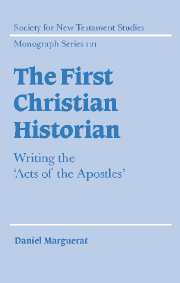Book contents
- Frontmatter
- Contents
- Preface
- 1 How Luke wrote history
- 2 A narrative of beginnings
- 3 The unity of Luke–Acts: the task of reading
- 4 A Christianity between Jerusalem and Rome
- 5 The God of Acts
- 6 The work of the Spirit
- 7 Jews and Christians in conflict
- 8 Ananias and Sapphira (Acts 5. 1–11): the original sin
- 9 Saul's conversion (Acts 9; 22; 26)
- 10 The enigma of the end of Acts (28. 16–31)
- 11 Travels and travellers
- Bibliography
- Index of passages
7 - Jews and Christians in conflict
Published online by Cambridge University Press: 22 September 2009
- Frontmatter
- Contents
- Preface
- 1 How Luke wrote history
- 2 A narrative of beginnings
- 3 The unity of Luke–Acts: the task of reading
- 4 A Christianity between Jerusalem and Rome
- 5 The God of Acts
- 6 The work of the Spirit
- 7 Jews and Christians in conflict
- 8 Ananias and Sapphira (Acts 5. 1–11): the original sin
- 9 Saul's conversion (Acts 9; 22; 26)
- 10 The enigma of the end of Acts (28. 16–31)
- 11 Travels and travellers
- Bibliography
- Index of passages
Summary
The question of the relationship between Jews and Christians has become a point of tension in the exegesis of Luke's work. The unusual vehemence with which this debate is conducted stems from its background: the reassessment of the Jewish–Christian relationship after the Shoah. In this context, biblical scholars rushed in to review the image of Judaism conveyed by the New Testament texts: in which cases is anti-Judaism a fact internal to the Scriptures and in which cases is it a perverse effect of the reading of the Scriptures? But the focusing on Luke–Acts can be explained by a fact peculiar to Luke's work itself: of all the New Testament writings, Luke–Acts presents not the most negative image of Judaism but the most difficult to grasp.
A contaminated debate
The fifty-two chapters of history from Luke 1 to Acts 28 lead the reader from the Temple in Jerusalem, at the beginning of the gospel, to Rome, where the book of Acts ends. What kind of relationship does Christianity have with Judaism? Is the movement from Jerusalem to Rome a symbolic shift? Has the God of Luke turned his back on Judaism in order to adopt Rome and pagan Christianity? Or does Christianity construct itself, on the contrary, in close continuity with the tradition of the fathers?
It is true that the reader could be surprised by the anachronism of the question.
- Type
- Chapter
- Information
- The First Christian HistorianWriting the 'Acts of the Apostles', pp. 129 - 154Publisher: Cambridge University PressPrint publication year: 2002

